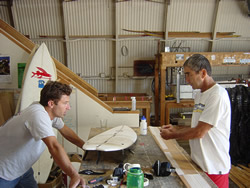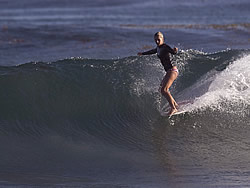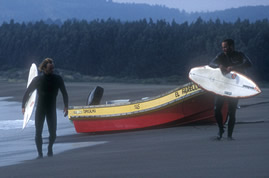Patagonia Surf: Jason McCaffrey interview
Patagonia is perhaps not best known for it’s surfing products. Most would think of fleeces and climbing gear when they hear the name. But in truth, Patagonia’s founder Yvon Chouinard has been surfing since his youth and surfing has always played a big role in the companies direction.
 Most of what Patagonia produces in its surfing line is clothing — something that may or may not be surf related. But they also make wetsuits, rash guards and baggies. Fletcher Chouinard is producing EPS/Epoxy boards that are built on the same terms as all of Patagonia’s other products and the boards are sold in their stores. More importantly, the companies commitment to product quality and sustainable business principles ensure that you get the most out of your hard earned money.
Most of what Patagonia produces in its surfing line is clothing — something that may or may not be surf related. But they also make wetsuits, rash guards and baggies. Fletcher Chouinard is producing EPS/Epoxy boards that are built on the same terms as all of Patagonia’s other products and the boards are sold in their stores. More importantly, the companies commitment to product quality and sustainable business principles ensure that you get the most out of your hard earned money.
Recently we contacted Patagonia’s Jason McCaffrey to get a bit more of an inside look into their surfing roots.
Q. First things first, tell us who you are and what your role is at Patagonia.
My name is Jason McCaffrey, I’m the Director of the Surf program at Patagonia
Q. I think it can be said that much of the public knowledge about sustainable business models comes by way of Patagonia. The company has a long tradition in looking towards multiple bottom lines that include social responsibility and the environment along with profit. Can you tell us a bit more about how this plays out daily for Patagonia staffers?
The idea of sustainability is something that I think a lot of people at Patagonia have in them before they get here. Not everyone of course, but many of the people involved with the founding of the company definitely thought that way and it has been passed on over the years. The issues sometimes change but the general idea stays the same, make the best stuff that lasts a long time in the least damaging way. It’s something that to be good at in terms of work, you have to take it home with you and apply it everywhere. So to answer your question, I would venture to say that everyone at Patagonia, to some degree, alters some portion of his or her day for the idea of sustainability. Whether it’s composting banana peels for a bio-fueled moped (just kidding… but you get the idea) or something as simple as having a garden, we all do something. Even cooler is that we’re not the only ones either, lots of companies are like us now, it’s pretty cool!
Q. Patagonia Surf has some heavy hitters in its roster of ambassadors. The Malloy brothers and Mr. Pipeline himself, Gerry Lopez. How long has Patagonia been making surf specific gear and how are those guys involved in the designs?
I guess you could say we’ve been making gear since day one. Yvon has always been a surfer that climbed, but he got well known for being the climber that surfed. It doesn’t matter either way, the guy’s got style. So to your point, I guess if you put climbing company near the beach for 25 years you start attracting surfers right? That’s exactly what happened and that’s why we have such a great group of people associated with and working with us on such an intricate level.  On the women’s side we have people like Mary Osborne, Belinda Baggs, Crystal Thornburgh and Liz Clar – all uniquely different yet similar in their innate ability to balance strength and grace. On the men’s side we have input from The Malloy’s, Gerry, Fletch and long time friend and ambassador Dave Ogle. The Malloy’s in particular are very involved with every aspect of the division. They have input and help steer the direction of the design of the clothing, ad layouts, board design and refinement, you name it they’re involved. It’s really cool, I fell really lucky to be working with the group of people we have representing our brand because they’re with us by choice, I mean, they’re really into what the company is about…how cool is that?
On the women’s side we have people like Mary Osborne, Belinda Baggs, Crystal Thornburgh and Liz Clar – all uniquely different yet similar in their innate ability to balance strength and grace. On the men’s side we have input from The Malloy’s, Gerry, Fletch and long time friend and ambassador Dave Ogle. The Malloy’s in particular are very involved with every aspect of the division. They have input and help steer the direction of the design of the clothing, ad layouts, board design and refinement, you name it they’re involved. It’s really cool, I fell really lucky to be working with the group of people we have representing our brand because they’re with us by choice, I mean, they’re really into what the company is about…how cool is that?
Q. There’s been lot of talk on the Internet lately about the environmental impact of limestone-based wetsuits. I won’t go into it here as I think it’s been well covered on The Cleanest Line. One thing that is always missing from those arguments though is product longevity — something that Patagonia is famous for. How long have you guys been testing the Patagonia wetsuits? How many seasons will one of the suits last for?
With reasonable care our suits will last for two seasons. By that I mean rinsing it out, keeping it out of the sun when not in use, not stepping on one leg to rip the other free, etc., the common sense basics of how to take care of a wetsuit. Our design, our ambassador team, and myself have seen every returned wetsuit firsthand in the last one and a half years and we know what goes wrong and how. This is what allows us to make continual improvements.
Q. Fletcher Chouinard has been making EPS boards for a long time now. And the company has always been straightforward about the materials used and what impact they have. What’s been the surf industries’ general response to the “Patagonia” surfboards? Especially with hi-profile guys like Dan Malloy ripping on Fletcher’s EPS boards.
Ah man, that’s a good one. I don’t think the surf industry even knew we existed. Maybe they did, it’s hard to say. I remember living in the parking lot with the guys thinking more about whose turn it was to go on the beer run for the evening, whose turn it was to build the barrel fire, and what there was to eat. Seriously, though, we received mention a few times in the surfer’s journal, once or twice in Surfer mag, but usually in reference to being the fringe guys doing weird stuff with epoxy that people were skeptical of. It’s funny how things change…
Q. As a nine to fiver I am really lucky to have some flexibility in my work to go surf when there are waves. Patagonia’s “Let My People Go Surfing” policy was created just to allow staffers flexibility to surf. I think that many of us have become used to the idea that a shitty part of life is work but Yvon Chouinard has shown the business world that employee quality of life actually improves productivity. Can you talk a little about the work culture at Patagonia? 
It’s great, you can do whatever you want if its the right time to be doing it. Surf, some guys are really into road biking, running, whatever it is you can go for it as long as you get your work done! Well, as long as it’s not golf, anything but golf.
Q. And now for our loaded question — what does sustainability mean to you?
Being able to get everything you need from a certain amount of space and leaving that space in a way that can be handed over to someone else to use.
Q. What’s in store for Patagonia Surf in the future?
We’ve never failed as long as doing the right thing has been our goal and I suspect we’ll just keep on doing just that.
Further Reading:
You can check out Patagonia’s Cleanest Line here.
You can also check a review of Yvon Chouinard’s “Let My People Go Surfing”. This is perhaps one of the better primers on sustainable business models and the ethical and environmental responsibilities in business.
Check out Fletcher Chouinard Designs at www.fcdsurfboards.com
Great article. It’s funny that Patagonia is considered kinda fringe in the surf business. Seems to me they are really doing it right and for the right reasons. I just went to the Surf Expo last weekend and it was really disappointing. Couldn’t find one single shaper attending. Just Boardworks and Surftech. It really feels like the industry has lost it’s soul. Most are public companies now with their eye on the bottom line. It good to know that Patagonia with their “dirt bag” ethic is still out there.